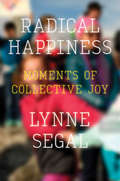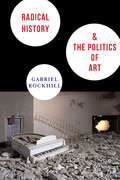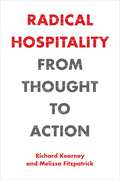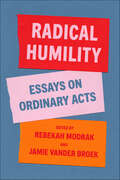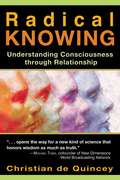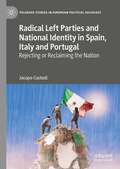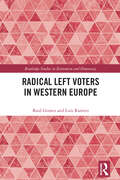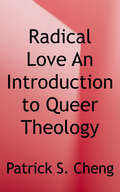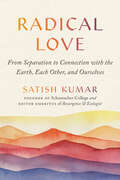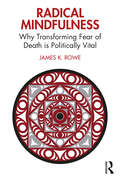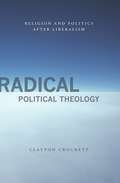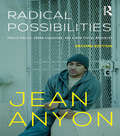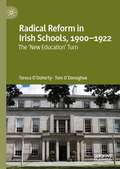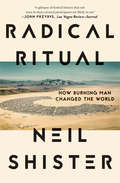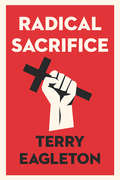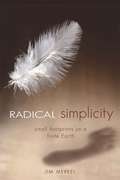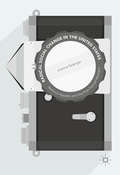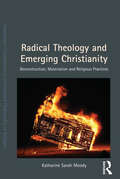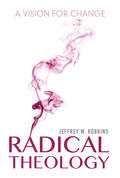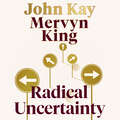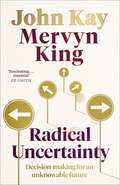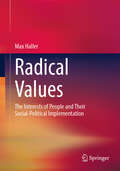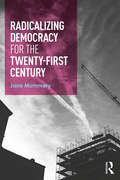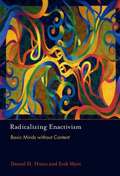- Table View
- List View
Radical Happiness: Moments of Collective Joy
by Lynne SegalWhat is the true meaning of happiness? Lynne Segal explores the radical potential of being togetherWhy are we so obsessed by the pursuit of happiness? With new ways to measure contentment we are told that we have a right to individual joy. But at what cost?In an age of increasing individualism, we have never been more alone and miserable. But what if the true nature of happiness can only be found in others? In Radical Happiness, leading feminist thinker Lynne Segal believes that we have lost the art of radical happiness— the art of transformative, collective joy. She shows that only in the revolutionary potential of coming together it is that we can come to understand the powers of flourishing.Radical Happiness is a passionate call for the re-discovery of the political and emotional joy that emerge when we learn to share our lives together.
Radical History and the Politics of Art
by Gabriel RockhillGabriel Rockhill opens new space for rethinking the relationship between art and politics. Rather than understanding the two spheres as separated by an insurmountable divide or linked by a privileged bridge, Rockhill demonstrates that art and politics are not fixed entities with a singular relation but rather dynamically negotiated, sociohistorical practices with shifting and imprecise borders. Radical History and the Politics of Art proposes a significant departure from extant debates on what is commonly called "art" and "politics," and the result is an impressive foray into the force field of history, in which cultural practices are meticulously analyzed in their social and temporal dynamism without assuming a conceptual unity behind them. Rockhill therefore develops an alternative logic of history and historical change, as well as a novel account of social practices and a multidimensional theory of agency. Engaging with a diverse array of intellectual, artistic, and political constellations, this tour de force diligently maps the various interactions between different dimensions of aesthetic and political practices as they intertwine and sometimes merge in precise fields of struggle.
Radical History and the Politics of Art (New Directions in Critical Theory #29)
by Gabriel RockhillGabriel Rockhill opens new space for rethinking the relationship between art and politics. Rather than understanding the two spheres as separated by an insurmountable divide or linked by a privileged bridge, Rockhill demonstrates that art and politics are not fixed entities with a singular relation but rather dynamically negotiated, sociohistorical practices with shifting and imprecise borders. Radical History and the Politics of Art proposes a significant departure from extant debates on what is commonly called "art" and "politics," and the result is an impressive foray into the force field of history, in which cultural practices are meticulously analyzed in their social and temporal dynamism without assuming a conceptual unity behind them. Rockhill thereby develops an alternative logic of history and historical change, as well as a novel account of social practices and a multidimensional theory of agency. Engaging with a diverse array of intellectual, artistic, and political constellations, this tour de force diligently maps the various interactions between different dimensions of aesthetic and political practices as they intertwine and sometimes merge in precise fields of struggle.
Radical Hospitality: From Thought to Action (Perspectives in Continental Philosophy)
by Richard Kearney Melissa FitzpatrickRadical Hospitality addresses a timely and challenging subject for contemporary philosophy: the ethical responsibility of opening borders, psychic and physical, to the stranger. Kearney and Fitzpatrick show how radical hospitality happens by opening oneself in narrative exchange to someone or something other than ourselves—by crossing borders, whether literal or figurative. Against the fears, dogmas, and demands for certainty and security that push us toward hostility, we also desire to wager with the unknown, leap into the unanticipated, and celebrate the new, a desire this book seeks to recognize and cultivate. The book contends that hospitality means chancing one’s hand, one’s arm, one’s very self, thereby opening a vital space for new voices to be heard, shedding old skins, and welcoming new understandings.Radical Hospitality engages with urgent moral conversations concerning identity, nationality, immigration, commemoration, and justice, moving between theory and praxis and on to the formative life of the classroom. Building on key critical debates on the question of hospitality ranging from phenomenology, hermeneutics and deconstruction to neo-Kantian moral critique and Anglo-American virtue ethics, the book explores novel possibilities for an ethics of hospitality in our contemporary world of border anxiety, refugee crises, and ecological catastrophe.
Radical Humility: Essays on Ordinary Acts
by Rebekah Modrak and Jamie Vander BroekAn innovative, &“valuable&” collection of essays by Charles M. Blow, Agnes Callard, and more on the personal and civic function of humility (Literature Lust). What does humility mean and why does it matter in an age of golden escalators and multibillionaires? How can the cultivation of humility empower us to see success in failure, to fight against injustice, to stretch beyond our usual ways of thinking, and to foster a culture of listening in an age of digital shouting? With contributions from renowned scholars as well as psychologists, artists, and many others, Radical Humility: Essays on Ordinary Acts offers guidance. Having witnessed the personal and civic costs of narcissism and arrogance, these and other writers consider humility as a valuable process―a state of being―with the power to impact institutions, systems, families, and individuals, and give voice to the ways in which humility is practiced in many ordinary but extraordinary actions. This groundbreaking collection is a thought-provoking read for anyone seeking alternatives to a culture of self-aggrandizing excess. Contributors: Aaron Ahuvia, Russell Belk, Charles M. Blow, Richard C. Boothman, Agnes Callard, Lynette Clemetson, Tyler Denmead, Nadia Danienta, Mickey Duzyj, Kevin Em, Eranda Jayawickreme, Kevin Hamilton, Eranda Jayawickreme, Troy Jollimore, Melissa Koenig, Aric Rindfleisch, Valerie Tiberius, and Ami Walsh
Radical Knowing: Understanding Consciousness through Relationship
by Christian De QuinceyA radical reassessment of what we mean by "consciousness" and how we experience it in relation to others • Shows the importance of integrating different ways of knowing--such as feeling and intuition, reason and the senses--in our approach to life • Discusses the technique of Bohmian Dialogue where you can learn not only to "feel your thinking," but also to experience true communion with others In Radical Knowing Christian de Quincey makes a provocative claim: We are not who we think we are. Instead, we are what we feel. Giving disciplined attention to feelings reveals the most fundamental fact of life and reality: We are our relationships. Most of us think we are individuals first and foremost who then come together to form relationships. De Quincey turns this "obvious fact" on its head and shows that relationship comes first, and that our individual sense of self--our "private" consciousness--actually arises from shared consciousness. This shared, collective consciousness is at the heart of indigenous ways of life and their worldviews. De Quincey explains that participating in shared consciousness literally builds the fabric of reality, and that understanding this process is key to unlocking our potential for higher consciousness and spiritual evolution. He presents the technique of Bohmian Dialogue, developed by groundbreaking quantum physicist David Bohm, as one method for experiencing this powerful process. He also explores the mystery of synchronicity, offering a new understanding of the relationship between matter and mind and the underlying nature of reality.
Radical Left Parties and National Identity in Spain, Italy and Portugal: Rejecting or Reclaiming the Nation (Palgrave Studies in European Political Sociology)
by Jacopo CustodiThis book investigates how the radical left navigates the terrain of nationalism. Traversing Spain, Italy and Portugal, this in-depth study examines how radical left parties either embrace, rebuff or reshape nationalistic sentiments. From Spain’s Podemos grappling with Franco’s legacy, Italy’s radical left switching from anti-fascist patriotism to cosmopolitanism, to Portugal’s revolutionary echoes in left-leaning banal nationalism, the book offers comprehensive insight into the often-overlooked relationship between radical left politics and national identity. Through discourse analysis, interviews and participant observation, it delves into the reasons behind certain political positions and how they manifest discursively. A must-read for those eager to decipher the crossroads of national identity and left-wing politics in contemporary Europe.
Radical Left Voters in Western Europe (Routledge Studies in Extremism and Democracy)
by Raul Gomez Luis RamiroRadical Left Voters in Western Europe explores who votes for Radical Left Parties in contemporary Western Europe, and why. Once considered a relic of the past which was doomed to disappear in affluent societies, Radical Left Parties were able to survive unprecedented electoral crises in the 1980s and 1990s to become a stable and significant feature of contemporary West European politics. Despite this, our knowledge of the electorate of contemporary Radical Left parties is extremely limited. To fill this gap, this book analyzes the radical left electorate in 17 West European countries (Belgium, Cyprus, Denmark, Finland, France, Greece, Germany, Iceland, Ireland, Italy, Luxembourg, the Netherlands, Norway, Portugal, Spain, Sweden, and Switzerland) for a period of 18 years (2000–2018). The research combines data from multiple sources (surveys, country-level data, and party-level data) to show how, amid social and political change, Radical Left Parties have been able to maintain a relatively sizeable and clearly identifiable electorate with fairly similar socio-demographic and attitudinal features. Moreover, the book argues that in order to explain electoral support for Radical Left Parties it is important to consider not only voter characteristics, but also the characteristics of the parties themselves and of the political and economic context in which they compete for votes. This book will be of interest to scholars of comparative politics, political sociology, electoral behaviour, and political parties.
Radical Love: An Introduction to Queer Theology
by Patrick S. ChengContextual theologies have developed from a number of perspectives - including feminist theology, black theology, womanist theology, Latin American liberation theology, and Asian American theology - and a wide variety of academic and general introductions exist to examine each one. However, Radical Love is the first introductory textbook on the subject of queer theology. In this lucid and compelling introduction, Cheng provides a historical survey of how queer theology has developed from the 1950s to today and then explicates the themes of queer theology using the ecumenical creeds as a general framework. Topics include revelation, God, Trinity, creation, Jesus Christ, atonement, sin, grace, Holy Spirit, church, sacraments, and last things, as seen through the lenses of LGBT theologians.
Radical Love: From Separation to Connection with the Earth, Each Other, and Ourselves
by Satish KumarTo see peace in our lifetimes, we have to practice love.This is the radical message of this inspirational book of pithy advice from environmental activist Satish Kumar, which helps us find ways to love ourselves, others, and all beings on planet Earth—even those we may find unlovable.Satish Kumar is well known for his epic walk for world peace in his youth in the 1960s from India to the nuclear capitals of Moscow, Paris, London, and Washington, DC. Wherever he traveled, he found that human beings were capable of a love that could overcome hatred and division. Settling down in the UK, he married his wife, June Mitchell, and founded eco-university Schumacher College in Devon, eventually becoming a leading figure in the UK green movement.Radical Love distills the author's lifetime of experience as a lover, parent, activist, and educator into simple lessons on transforming our time of ecological crisis, conflict, and scarcity into one in which we experience harmony with nature, safety, and abundance. It is an exploration of the transformative power of love in all its forms, from romantic love to love for one's family and community to love for the planet and all beings. Kumar's approach is founded on simplicity (including the Jain principle of aparigraha), generosity, and continuous learning. Like an unfolding metta meditation, the book expands our notions of love to its most sublime universal state and makes a great gift to share with those we love.
Radical Mindfulness: Why Transforming Fear of Death is Politically Vital
by James K. RoweRadical Mindfulness examines the root causes of injustice, asking why inequalities along the lines of race, class, gender, and species continue to exist. Specifically, James K. Rowe examines fear of death as a root cause of systemic inequalities and proposes a more embodied approach to social change as a solution. Collecting insights from powerful thinkers across multiple traditions—including Black radicals, Indigenous resurgence theorists, terror management theorists, and Buddhist feminists— Rowe argues for the political importance of seemingly apolitical practices such as meditation and ritual. On their own, these strategies are not enough, but integrated into social movements that are combating structural injustices, mind–body practices can begin transforming the embodied fears that feed endless fuel to supremacist ideologies and yet are not targeted by most political actors. Radical Mindfulness is for academics, activists, and individuals who want to overcome supremacy of all kinds but are struggling to understand and develop methods for attacking it at the roots.
Radical Political Theology: Religion and Politics After Liberalism (Insurrections: Critical Studies in Religion, Politics, and Culture)
by Clayton CrockettIn the 1960s, the strict opposition between the religious and the secular began to break down, blurring the distinction between political philosophy and political theology. This collapse contributed to the decline of modern liberalism, which supported a neutral, value-free space for capitalism. It also deeply unsettled political, religious, and philosophical realms, forced to confront the conceptual stakes of a return to religion.Gamely intervening in a contest that defies simple resolutions, Clayton Crockett conceives of the postmodern convergence of the secular and the religious as a basis for emancipatory political thought. Engaging themes of sovereignty, democracy, potentiality, law, and event from a religious and political point of view, Crockett articulates a theological vision that responds to our contemporary world and its theo-political realities. Specifically, he claims we should think about God and the state in terms of potentiality rather than sovereign power. Deploying new concepts, such as Slavoj i ek's idea of parallax and Catherine Malabou's notion of plasticity, his argument engages with debates over the nature and status of religion, ideology, and messianism. Tangling with the work of Derrida, Deleuze, Spinoza, Antonio Negri, Giorgio Agamben, Alain Badiou, John D. Caputo, and Catherine Keller, Crockett concludes with a reconsideration of democracy as a form of political thought and religious practice, underscoring its ties to modern liberal capitalism while also envisioning a more authentic democracy unconstrained by those ties.
Radical Possibilities: Public Policy, Urban Education, and A New Social Movement (Critical Social Thought Ser.)
by Jean AnyonThe core argument of Jean Anyon’s classic Radical Possibilities is deceptively simple: if we do not direct our attention to the ways in which federal and metropolitan policies maintain the poverty that plagues communities in American cities, urban school reform as currently conceived is doomed to fail. With every chapter thoroughly revised and updated, this edition picks up where the 2005 publication left off, including a completely new chapter detailing how three decades of political decisions leading up to the “Great Recession” produced an economic crisis of epic proportions. By tracing the root causes of the financial crisis, Anyon effectively demonstrates the concrete effects of economic decision-making on the education sector, revealing in particular the disastrous impacts of these policies on black and Latino communities. Going beyond lament, Radical Possibilities offers those interested in a better future for the millions of America’s poor families a set of practical and theoretical insights. Expanding on her paradigm for combating educational injustice, Anyon discusses the Occupy Wall Street movement as a recent example of popular resistance in this new edition, set against a larger framework of civil rights history. A ringing call to action, Radical Possibilities reminds readers that throughout U.S. history, equitable public policies have typically been created as a result of the political pressure brought to bear by social movements. Ultimately, Anyon’s revelations teach us that the current moment contains its own very real radical possibilities.
Radical Reform in Irish Schools, 1900-1922: The 'New Education' Turn
by Tom O'Donoghue Teresa O'DohertyThis book examines the radical reform that occurred during the final two decades of British rule in Ireland when William Starkie (1860–1920) presided as Resident Commissioner for the Board. Following the lead of industrialized nations, Irish members of parliament sought to encourage the establishment of a state-funded school system during the early nineteenth century. The year 1831 saw the creation of the Irish National School System. Central to its workings was the National Board of Education which had the responsibility for distributing government funds to aid in the building of schools, the payment of inspectors and teachers, the publication of textbooks, and the cost of teacher training. In the midst of radical political and cultural change within Ireland, visionaries and leaders like Starkie filled an indispensable role in Irish education. They oversaw the introduction of a radical child-centered primary school curriculum, often referred to as the ‘new education’. Filling a gap in Irish history, this book provides a much needed overview of the changes that occurred in primary education during the 22 years leading up to Ireland’s independence.
Radical Ritual: How Burning Man Changed the World
by Neil Shister"Neil Shister's book skillfully traces the evolution of Burning Man and provides rare insights into how this cultural phenomenon is changing the world." —Michael Mikel, founding board member of the Burning Man ProjectWritten from Neil Shister’s perspective as a journalist, student of American culture, and six–time participant in Burning Man, Radical Ritual presents the event as vitally, historically important. Shister contends that Burning Man is a significant player in the avant–garde, forging new social paradigms as liberal democracy unravels. Burning Man’s contribution to this new order is postmodern, a fusion of sixties humanism with state–of–the–art Silicon Valley wizardry.Shister is not alone in his opinion. In 2018, the Smithsonian dedicated its entire Renwick Gallery, located next door to the White House, to an exhibition of Burning Man art and culture. The festival intertwines conservative and progressive ideas. On one hand it is a celebration of self–reliance, personal accountability, and individual freedom; on the other hand it is based on strong values of inclusion, consensual decision making, and centered, collaborative endeavor.In a wonderful mix of narrative storytelling and reportage, Radical Ritual discusses how Burning Man has impacted the art world, disaster relief, urban renewal, the utilization of renewable energy, and even the corporate governance of Google. The story concludes with the sudden death in April 2018 of Larry Harvey, now renowned as the philosophical epicenter of the movement.
Radical Sacrifice
by Terry EagletonA trenchant analysis of sacrifice as the foundation of the modern, as well as the ancient, social order The modern conception of sacrifice is at once cast as a victory of self-discipline over desire and condescended to as destructive and archaic abnegation. But even in the Old Testament, the dual natures of sacrifice, embodying both ritual slaughter and moral rectitude, were at odds. In this analysis, Terry Eagleton makes a compelling argument that the idea of sacrifice has long been misunderstood. Pursuing the complex lineage of sacrifice in a lyrical discourse, Eagleton focuses on the Old and New Testaments, offering a virtuosic analysis of the crucifixion, while drawing together a host of philosophers, theologians, and texts—from Hegel, Nietzsche, and Derrida to the Aeneid and The Wings of the Dove. Brilliant meditations on death and eros, Shakespeare and St. Paul, irony and hybridity explore the meaning of sacrifice in modernity, casting off misperceptions of barbarity to reconnect the radical idea to politics and revolution.
Radical Simplicity: Small Footprints on a Finite Earth
by Jim MerkelImagine you are first in line at a potluck buffet. The spread includes not just food and water, but all the materials needed for shelter, clothing, healthcare, and education. How do you know how much to take? How much is enough to leave for your neighbours behind you -- not just the six billion people, but the wildlife, and the as-yet-unborn? In the face of looming ecological disaster, many people feel the need to change their own lifestyles as a tangible way of transforming our unsustainable culture. Radical Simplicity is the first book that guides the reader to a personal sustainability goal, then offers a process to monitor progress to a lifestyle that is equitable amongst all people, species, and generations. Combining lyrical narrative, compassionate advocacy and absorbing science, Radical Simplicity is a practical, personal answer to 21st century challenges that will appeal as much to Cultural Creatives and students as to spiritual seekers, policy makers and sustainability professionals.
Radical Social Change in the United States: Badiou's Apostle and the Post-Factual Moment
by Joanna SwangerThis book tackles the question of why the United States is so resistant to radical change towards economic justice and peace. Taking full stock of the despair that launched the popular support for Bernie Sanders and Donald Trump, Swanger historicizes the political paralysis of post-1974 United States that deepened already severe economic inequalities, asking how the terrain for social movements in the early twenty-first-century US differs from that of the 1960s. This terrain is marked by the entrenchment of neoliberalism, anti-intellectualism, and difficulties paradoxically posed by the ease of social media. Activists now must contend with a paralyzing “post-factual” moment. Alain Badiou’s thought informs this book on breaking through contemporary political paralysis.
Radical Theology and Emerging Christianity: Deconstruction, Materialism and Religious Practices (Intensities: Contemporary Continental Philosophy of Religion)
by Katharine Sarah MoodyThe ’theological turn’ in continental philosophy and the ’turn to Paul’ in political philosophy have occasioned a return to radical theology, a tradition whose philosophical heritage can be traced to the death of God announced in the work of Nietzsche and Hegel. John D. Caputo’s deconstructive theology and Slavoj Zizek’s materialist theology are two radical theologies that explore what it might mean to pass through the death of God and to abandon this experience as specifically Christian. Radical Theology and Emerging Christianity demonstrates how these theologies are transforming everyday religious practices through an examination of the work of Peter Rollins and Kester Brewin, two figures at the radical margins of a contemporary expression of Western religiosity called emerging Christianity. The author uses her analysis of all four figures to argue that deconstructive practices can enable religious communities to become part of a wider materialist collective in which the death of God continues to resonate. Pushing the methodological boundaries of philosophy of religion by examining religious practices as the site of philosophical signification, the book challenges scholars and practitioners alike to a new and more demanding dialogue between theory and practice.
Radical Theology: A Vision for Change
by Jeffrey W. Robbins"Radical theology" and "political theology" are terms that have gained a lot of currency among philosophers of religion today. In this visionary new book, Jeffrey W. Robbins explores the contemporary direction of these movements as he charts a course for their future. Robbins claims that radical theology is no longer bound by earlier thinking about God and that it must be conceived of as postsecular and postliberal. As he engages with themes of liberation, gender, and race, Robbins moves beyond the usual canon of death-of-God thinkers, thinking "against" them as much as "with" them. He presents revolutionary thinking in the face of changing theological concepts, from reformation to transformation, transcendence to immanence, messianism to metamorphosis, and from the proclamation of the death of God to the notion of God's plasticity.
Radical Uncertainty: Decision-making for an unknowable future
by John Kay Mervyn KingLONGLISTED FOR THE FT/MCKINSEY BUSINESS BOOK OF THE YEAR AWARD 2020'A brilliant new book' Daily Telegraph'Well written . . . and often entertaining'The Times'A sparkling analysis'Prospect'Entertaining and enlightening . . . This is a necessary critique and they make it with verve, knowledge and a wealth of stories' Financial Times'An elegant, wise and timely book' Irish Times'Jam-packed with erudition' New StatesmanThis major, critically acclaimed work asks a vitally important question for today: when uncertainty is all around us, and the facts are not clear, how can we make good decisions? We do not know what the future will hold, particularly in the midst of a crisis, but we must make decisions anyway. We regularly crave certainties which cannot exist and invent knowledge we cannot have, forgetting that humans are successful because we have adapted to an environment that we understand only imperfectly. Throughout history we have developed a variety of ways of coping with the radical uncertainty that defines our lives. This incisive and eye-opening book draws on biography, history, mathematics, economics and philosophy to highlight the most successful - and most short-sighted - methods of dealing with an unknowable future. Ultimately, the authors argue, the prevalent method of our age falls short, giving us a false understanding of our power to make predictions, leading to many of the problems we experience today.
Radical Uncertainty: Decision-making for an unknowable future
by John Kay Mervyn KingLONGLISTED FOR THE FT/MCKINSEY BUSINESS BOOK OF THE YEAR AWARD 2020'A brilliant new book' Daily Telegraph'Well written . . . and often entertaining'The Times'A sparkling analysis'Prospect'Entertaining and enlightening . . . This is a necessary critique and they make it with verve, knowledge and a wealth of stories' Financial Times'An elegant, wise and timely book' Irish Times'Jam-packed with erudition' New StatesmanThis major, critically acclaimed work asks a vitally important question for today: when uncertainty is all around us, and the facts are not clear, how can we make good decisions? We do not know what the future will hold, particularly in the midst of a crisis, but we must make decisions anyway. We regularly crave certainties which cannot exist and invent knowledge we cannot have, forgetting that humans are successful because we have adapted to an environment that we understand only imperfectly. Throughout history we have developed a variety of ways of coping with the radical uncertainty that defines our lives. This incisive and eye-opening book draws on biography, history, mathematics, economics and philosophy to highlight the most successful - and most short-sighted - methods of dealing with an unknowable future. Ultimately, the authors argue, the prevalent method of our age falls short, giving us a false understanding of our power to make predictions, leading to many of the problems we experience today.
Radical Values: The Interests of People and Their Social-Political Implementation
by Max HallerA famous and frequently quoted sentence by Max Weber states: &“Interests, not ideas, directly govern the actions of people. However, the &‘worldviews&’ created by &‘ideas&’ have often determined the paths in which the dynamics of interests propelled action.&” Recent sociology, however, has not done justice to this principle. Values and their effects are either assumed to be given (as in the case of Talcott Parsons) or considered entirely irrelevant (as in Rational Choice and System Theory). Extensive empirical research on values has yielded many results but has largely lacked a theoretical foundation, making its findings often contestable. Weber himself provided only unsatisfactory answers regarding the relevance of values: The decision for specific values is a purely individual matter, and there is an irreconcilable struggle between different values. This book comprehensively examines this issue for the first time in sociology and finds a new, constructive, and explanatory solution - drawing on authors such as Immanuel Kant, George H. Mead, and Raymond Boudon. It is utilizing considerations from philosophy, social theory, and empirical social research, as well as incorporating historical struggles for the recognition and enforcement of values. It can be determined that there are fundamental societal values, that their number can be clearly defined, and that there is not necessarily conflict between them, but rather complementarity. With these theses and findings, this book can be regarded as a new sociological standard work. It is also of fundamental importance for students and researchers in many other humanities and social science disciplines.
Radicalizing Democracy for the Twenty-first century
by Jane MummeryWhile the subject of democracy has been explored by philosophers since ancient times, in the last few decades democracy has been taken for granted in the West as the political norm. The recognition of democracy as an empty concept in Western political discourse and the emergence of theories of radical democracy have renewed engagement in democratic theory and politics. Radicalizing Democracy for the Twenty-first Century explores the radicalizing movement in democratic thought and: • Introduces readers to the key debates in contemporary philosophical theories about democracy. • Confronts popular assumptions about democracy. • Provides a philosophical underpinning for the rise of radical democratic theories, movements and politics. • Examines how radical democracy can respond to the challenges of the contemporary world. Radicalizing Democracy for the Twenty-first Century is an important resource for students, scholars and university teachers in the field of political philosophy, political theory and international relations.
Radicalizing Enactivism
by Daniel D. Hutto Erik MyinMost of what humans do and experience is best understood in terms of dynamicallyunfolding interactions with the environment. Many philosophers and cognitive scientists nowacknowledge the critical importance of situated, environment-involving embodied engagements as ameans of understanding basic minds -- including basic forms of human mentality. Yet many of thesesame theorists hold fast to the view that basic minds are necessarily or essentially contentful --that they represent conditions the world might be in. In this book, Daniel Hutto and Erik Myinpromote the cause of a radically enactive, embodied approach to cognition that holds that some kindsof minds -- basic minds -- are neither best explained by processes involving the manipulation ofcontents nor inherently contentful. Hutto and Myin oppose the widely endorsed thesis that cognitionalways and everywhere involves content. They defend the counter-thesis that there can beintentionality and phenomenal experience without content, and demonstrate the advantages of theirapproach for thinking about scaffolded minds and consciousness
